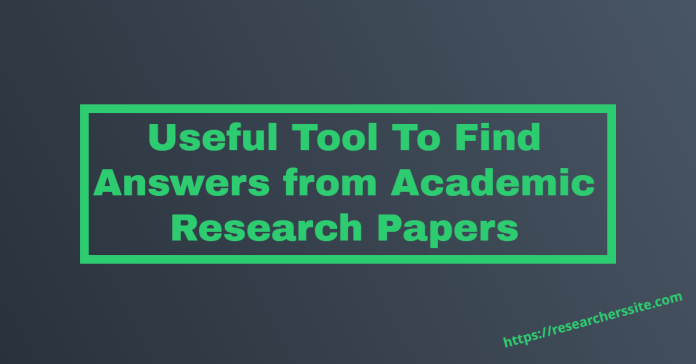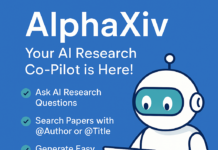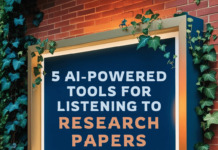Are you tired of spending countless hours analyzing data for your academic research work? In this blog, I will demonstrate AI-powered useful tool Elicit and I also show you how to find the answers from academic research papers.
To maximize research efficiency this robust research paper discovery tool plays a pivotal role. Using natural language processing and machine learning, the research assistant tool streamlines the research process.
Besides, it allows users to accelerate their research efforts and gain insights faster. Using AI technology it can reveal main findings quickly.
Elicit is a research assistant application that uses uses language models currently GPT-3 to help researchers find most relevant information from academic journal articles.
As of the beginning of 2022, the main users of Elicit are individuals who are engaged in research activities such as researchers in academic area.
These users consider Elicit to be extremely helpful in terms of discovering relevant papers to reference in their own work and establishing the direction of their research.
Elicit is a generative as it uses existing text but may generate new text to answer. It also uses datasets from Semantic Scholar corpus.
Moreover, the Elicit Literature Review workflow is a comprehensive set of tools designed to simplify and optimize the research process for users.
By integrating semantic similarity and keyword matching, the workflow helps users find relevant scholarly articles that may not align with their specified keywords.
Specific abstract summaries are available to users to help them quickly determine the suitability of a scholarly article to their research.
The citation graph search feature of the workflow allows users to search both forwards and backwards for additional pertinent papers.
Users can customize their view of the paper and sort their papers based on specific criteria.
Furthermore, the workflow provides a filter function based on study type that lets you quickly find the studies they need.
The Researchers can save and export their work for future reference, making it easy to track research progress and collaborate with others.
Overall, the tool can help users efficiently locate, organize, and manage their academic research paper.
If you mark any results as favorites in Elicit, it scans the citation graph of those papers to identify more relevant papers. This means that it analyzes all the research papers cited in the papers you selected and all the papers that have cited them in the future.
Although some search tools, like Research Rabbit (I briefly described it on my blogpost 9 Innovative Literature Mapping Tools Every Researcher Needs to Know) and Connected Papers (See my earlier blog How to Find and Explore Research Papers Using Visual Tool), offer comparable features, most search tools lack these capabilities.
The search tools that incorporate citation graph analysis usually do not reorganize the results based on the semantic relevance of your query or summarize the resulting papers.
Elicit is developed by a non-profit machine learning research laboratory called Ought, which has a team of eight individuals who are located across various areas such as the Bay Area, Austin, New York, and Oristà.
How to Use the Tool to Find Answers from Academic Research Papers
In order to discover relevant academic papers without perfect keyword match we use Elicit AI based Research Assistant.
In addition to that it can also extracts the key information from the research papers.
The tool summarizes takeaways from the research companion specific to your question.
In order to begin utilizing Elicit, it is necessary to register for an account on their website. Once you create the account, you can access the application tool by logging in.
Step #1: Sign Up and Log In
To start using Elicit, you’ll need to sign up for an account on their website. Once you’ve created your account, log in to access the platform.
To access the application you click here. Once you open the site the following page will appear:
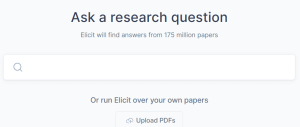
In order get answers from your own research paper you can directly upload your paper.
Step#2: Enter your Query to Find Answers
Now, you just enter your research question. Once you enter the query, the tool gives you the answer from 175 million papers,
In our case we have selected the sample question (What is the impact of creatine on cognition?) from the tool.
The following page will appear:
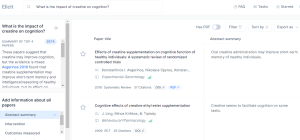
You can also select the brainstorm questions available on your screen against the research question “What is the impact of creatine on cognition?”
If you select anyone and click on that a new dashboard will generate with their answers.
Once you turn the “Has PDF” option on. the pdf version of the academic research paper will appear.
Additionally, you can also filter the result like keywords, year-wise publication and their study type.
According their following study type you can filter:
- Randomized Controlled Trial
- Review
- Systematic Review
- Meta-Analysis
- Longitudinal
You can add information about all academic journal papers like abstract summary, intervention. outcomes measured and number of participants.
Here is the abstract summary of the above research question:

Step #3: Save and Export
After getting results you can export the same as BIB or CSV data. Below is the snapshot of the export system:

Besides, you can sort paper abstract, pdf, year and Citation and paper summary.
When applying filters, you can use the date filter in the dashboard.
You might want to have results only with full text (to fully utilise extractive capabilities of the AI powered tool).
And filter to show only records with PDF because the tool uses the corpus from Semantic Scholar, which includes records with metadata only and some records with full text.
You can use the link to create task. It lets you share those “tasks” you have created with other users of this application.
Here is the examples created by other users:
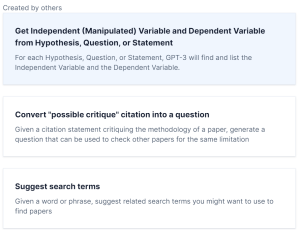
Frequently Asked Questions (FAQ) for Useful Tool Elicit
The AI-powered Elicit research assistant tool is a valuable and effective tool for academic researchers looking to quickly and accurately find answers from scholarly research papers.
Its advanced natural language processing capabilities, customizable search parameters, and user-friendly interface make it a go-to resource for anyone seeking to streamline their research process.
With Elicit AI based web application, the time and effort required to navigate the vast sea of academic literature can be greatly reduced, leaving researchers more time to focus on their own analysis and contributions to the field.
We hope you liked this blogpost on useful tool to find the answer from academic research paper.
If you know of any other online information extraction tools, let me know via the comment box below.
Like this post ? Don’t forget to share it !


